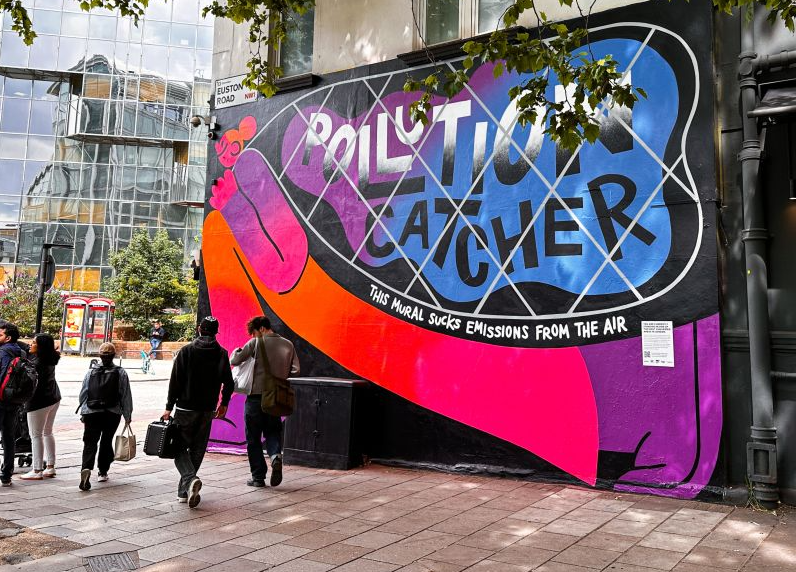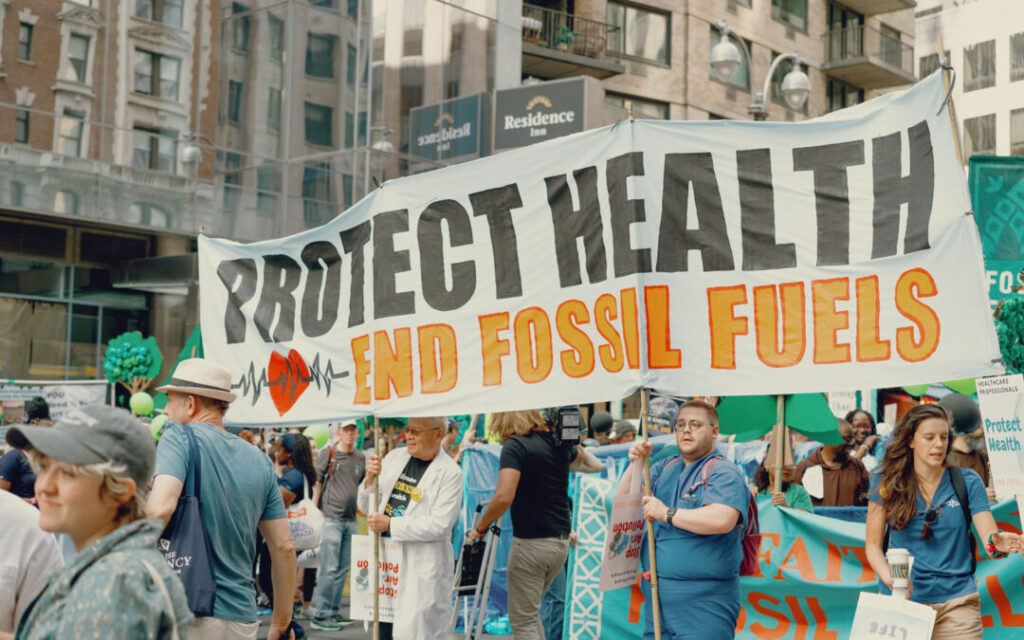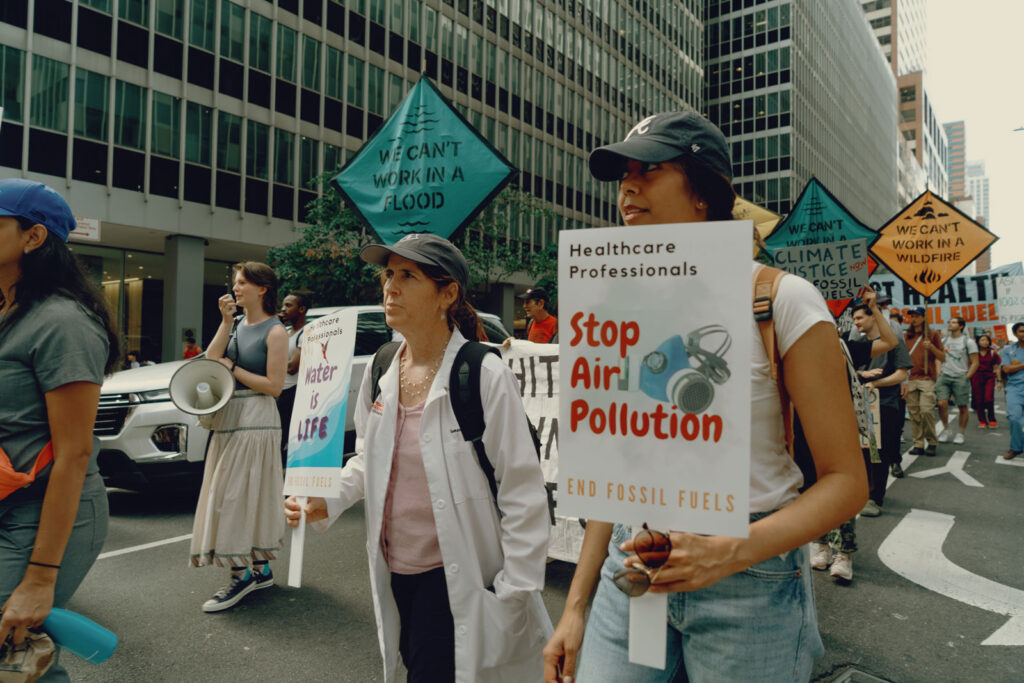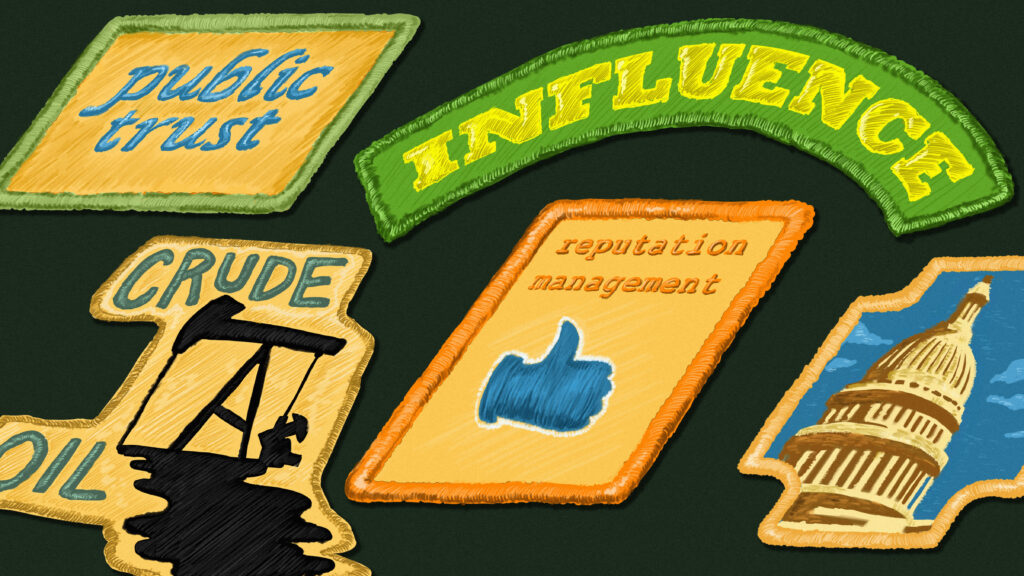The Euston Road is one of London’s most polluted neighbourhoods. But on a street corner, advertising company Dentsu offered a solution designed to literally clear the air.
Unveiled in partnership with environmental charity Global Action Plan, for Clean Air Day on June 20, the short-lived mural depicted a pink and purple woman catching fumes in a net. The secret sauce: paint supposedly capable of converting airborne pollutants into “harmless salts”.
“Air pollution impacts every organ in the body and is the biggest environmental threat to health,” read a Dentsu webpage describing the promotion, called “This Campaign Sucks”. “It’s an urgent problem that affects all of us, but it is solvable.”
An urgent problem, it seems, that’s being fueled by Dentsu itself.
Subscribe to our newsletter
Stay up to date with DeSmog news and alerts
New research by DeSmog has found that over the last five years, the multinational Japanese holding company and its subsidiaries have held at least 27 contracts to deliver public relations, advertising, and marketing campaigns for 25 different fossil fuel producers, including Shell, ExxonMobil and BP.
In May, the campaign group Clean Creatives awarded Dentsu a satirical “Excellence in Science Fiction” award for its work promoting controversial carbon capture projects on behalf of Chevron.
Campaigners said Dentsu’s air-purifying paint stunt was emblematic of double standards exhibited by many advertising companies, which frequently win plaudits for green campaigns while continuing to promote the interests of companies ramping up production of oil and gas.
Burning fossil fuels causes over 60 percent of an estimated 8.3 million global air pollution deaths every year, according to a 2023 study in the British Medical Journal.
“If Dentsu was genuinely committed to clean air it wouldn’t be promoting multiple polluters,” said author and anti-advertising campaigner Andrew Simms. “You can’t claim credit for a minor techno fix if at the same time you’re aiding major pollution. It looks like they’re glossing over a big conflict of interest with a small paint job.”
Earlier this month, United Nations Secretary General Antonio Guterres exhorted advertising agencies to stop working for fossil fuel companies.
“I call on these companies [ad and PR agencies] to stop acting as enablers to planetary destruction,” Guterres said in New York. “Stop taking on new fossil fuel clients, from today, and set out plans to drop your existing ones.”
Dentsu’s “This Campaign Sucks” project, however, puts the holding group in good company with other leading agencies that appear content to continue loudly promoting the occasional green stunt, while drawing less attention to their fossil fuel work.
Vanishing Act
When the mural launched on June 13, a Dentsu Instagram account urged members of the public to share a picture with the hashtag #thiscampaignsucks. “We’re thrilled to unveil our new pollution-catching art installation on Euston Road in central London,” the post said. “But this isn’t any art, it’s art that literally sucks pollution out of the air, and we need your help to spread the word.”
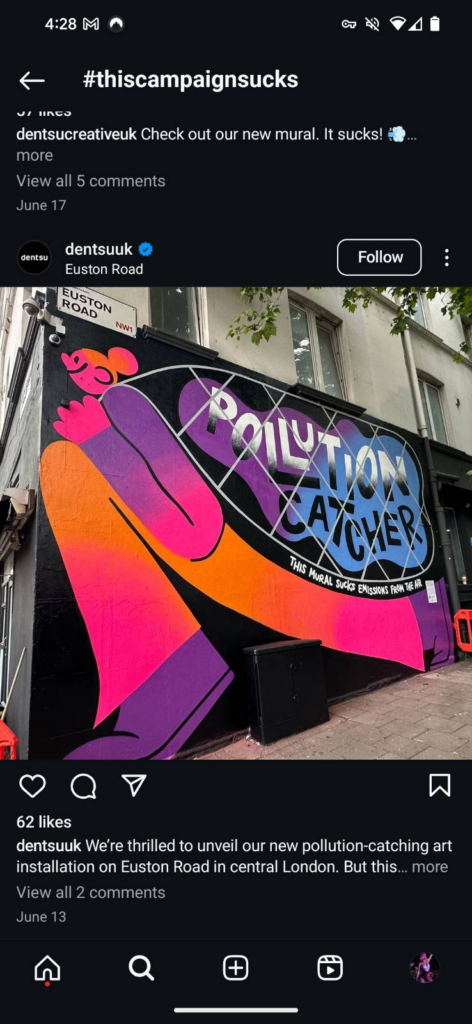
Designed by environmental tech firm Resysten, the paint used for the mural reduces air pollution levels “by 73 percent”, via a chemical reaction that can break down harmful gases, such as nitrogen oxides, according to the mural website. However, Dentsu did not provide any detailed scientific or technical information to back up those claims.
The webpage described the mural as still “live” on June 24, and urged people to visit. However, when DeSmog attempted to locate the mural that day, it had been painted over in black, as if it had never been. Staff at a nearby restaurant said the mural had disappeared a day or two earlier, suggesting it had been on display for less than two weeks.
In contrast to the Instagram post and dedicated mural webpage, DeSmog found no mention of Dentsu’s 25 fossil fuel clients on the company’s global website.

Dentsu did not respond to a request for comment.
‘A Cynical Game’
Dentsu has worked on a number of other recent climate and sustainability campaigns.
The firm’s “Zero Malaria: Change the Story” campaign for Malaria No More UK was fronted by former England football captain David Beckham and focused on how climate change is affecting the fight against malaria.
Dentsu also works with the Global Energy Alliance for People and Planet, an international organisation promoting clean energy.
“Advertising agencies are as able as oil companies to use greenwash to get the public approval they need to operate,” said Simms. “Environmental organisations need to be very careful that they don’t sell their causes short by working with agencies who, at the very least, have a conflict of interest, and at worst might be playing a damaging and cynical game.”
Announcing the launch of “This Campaign Sucks”, Global Action Plan director of corporate partnerships Nicky O’Malley said her organisation was “delighted” to work with Dentsu on the project, according to industry publication Marketing Beat.
But Victoria Harvey, a PhD researcher studying sustainability in the UK advertising industry at the University of East Anglia, questioned the decision to partner with a company that regularly promotes and protects the industry causing the very problems the group is trying to solve.
“Especially when there are thousands of creative shops to choose from that don’t have oil and gas clients,” Harvey said.
In response to a request for comment from DeSmog, Global Action Plan CEO Sonja Graham said the purpose of its Clean Air Day campaign was to urge the next government to reduce air pollution and carbon emissions by boosting access to greener modes of transport.
“The main focus of our work with Dentsu, who are part of ethical advertising initiatives, is to engage with and educate their staff about air pollution and get them involved in campaigning for clean air,” Graham said. “We have a policy which prevents us from working with companies that extract or invest in the extraction of fossil fuels. It does not currently prevent us from working with service providers such as advertising agencies and consultancies.
“We are very interested in reviewing what DeSmog has uncovered in detail.”
In September last year, the Paris-based global communications group Havas came under fire from activists for taking on a lucrative contract with Shell, despite making many public climate pledges.
The Fossil Fuel Nonproliferation Treaty — an international initiative calling for an end to the fossil fuel era — immediately terminated a contract with Havas when news of the deal broke.
‘No Room for Compromise’
Dentsu’s website says there is “no room for compromise” on climate action. The company has set a target to reach net zero by 2040.
This target includes emissions created by the operation of the business, such as powering buildings, employee travel, and the process of producing ads.
A notable absence in these climate plans, however, is any move to stop promoting or protecting companies fuelling the climate crisis.
In July 2023, Dentsu published an estimate of the “advertised emissions” caused by its campaigns – making it the only one of the industry’s “Big Six” holding companies — WPP, Omnicom, Interpublic Group (IPG), Publicis Groupe, Dentsu, and Havas — to do so. The term refers to the increase in carbon emissions associated with actions taken by consumers after seeing adverts, such as buying a plane ticket after watching a TV ad for an airline.
The estimated advertised emissions were 32 times higher than the emissions from Dentsu’s day-to-day operations. A note accompanying the estimate said that if future regulations ever make Dentsu accountable for a portion of these emissions, the financial cost may be “extremely high.”
“Advertised emissions” were not subsequently integrated into Dentsu’s net-zero plan. For now, Dentsu continues to run oil and gas advertising campaigns from its solar-powered offices.
This article was published alongside the addition of Dentsu to DeSmog’s Advertising and Public Relations Database, where you can browse our research on the advertising and PR industry firms which have protected the reputation of their fossil fuel clients and created greenwashing campaigns to convince the public that climate change is not an urgent threat.
This story has been corrected to make clear that the mural was unveiled in a partnership involving Dentsu and Global Action Plan. An earlier version of the story incorrectly stated that Global Action Plan had commissioned the mural.
Subscribe to our newsletter
Stay up to date with DeSmog news and alerts


